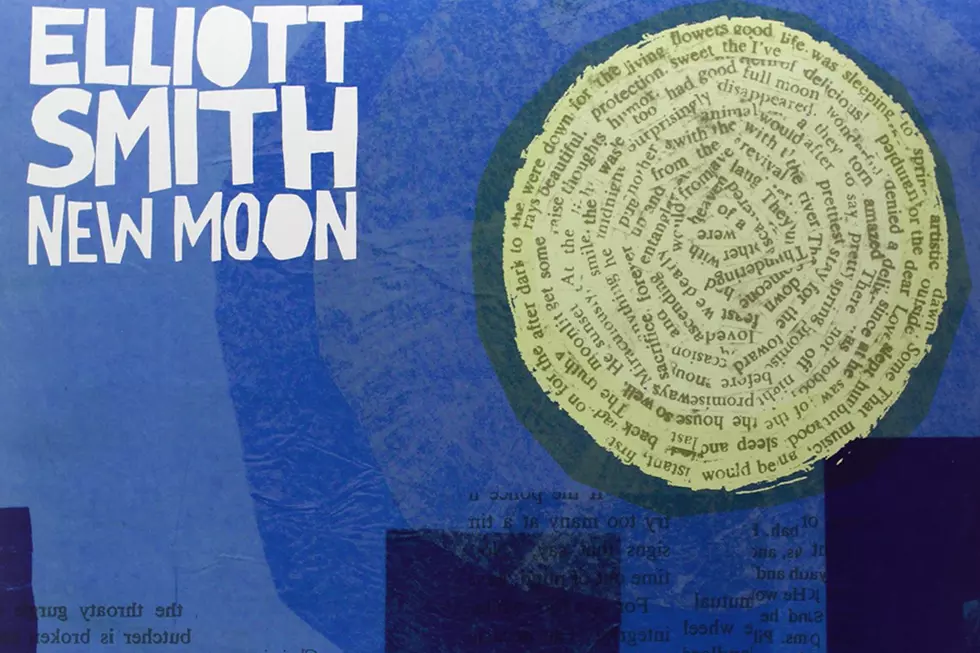
The Story of Elliott Smith’s Self-Titled Second Album
Haunting. There's no better word to describe Elliott Smith's sophomore album, released on July 21, 1995.
Listening to Elliott Smith is a bit like willing a soap bubble to drift away rather than explode, its delicate skin shimmering in the sunlight. Part of the beauty is the tension created by the desire that it last forever and the sorrow of its impermanence.
That pretty much sums up Elliott Smith, too, at least in retrospect. Like Nick Drake before him, listening to Smith's songs without his inevitable demise crossing one's mind borders on impossible. We know that beneath the shimmering surface of the delicate bubbles lies addiction, depression, childhood abuse and on Oct. 21, 2003, the artist's tragic death.
None of this was evident in September 1994 when Smith set up at friend Tony Lash's house and began recording what would become his second solo album. The two went all the way back to high school, where they played together in the band Stranger Than Fiction and later Heatmiser. It was the latter band with which Smith enjoyed his first success, particularly in Portland where they were the local band.
Listen to "Christian Brothers" by Heatmiser
Success wasn't enough. Smith outgrew Heatmiser's grungy roots. The documentary Heaven Adores You includes footage of the singer saying, “Everything was just as loud as I could possibly do it. I can’t listen to those records now.” He began playing solo acoustic shows in the singer-songwriter vein -- just Smith, a microphone, and a rapt audience hanging on every quiet word.
Roman Candle followed in '94. Smith's debut solo album is a lo-fi classic, recorded with a cheap microphone on a four-track recorder. While touring to support the record, Smith's orbit collided with that of Slim Moon, founder of the record label Kill Rock Stars, who later told Pitchfork, "I didn't know Elliott at all, but we were both playing on this small tour of solo artists going down the West Coast. The first night was in Seattle, and I missed Elliott's set. The second night was at the Bottom of the Hill in San Francisco, and I was blown away by Elliott's set. So I went out to the car to listen to [Roman Candle] rather than staying for the rest of the show. I was just flabbergasted. It was so incredibly good. And really, really different from anything anybody else was doing. It was soft and gritty at the same time—a really rare combination."
Moon's excitement was shared by most music fans who discovered Smith, either in small clubs on that tour or by happening upon Roman Candle. His initial business engagement with Smith wasn't to sign him to Kill Rock Stars, but rather to act as middleman between the young artist and K Records' founder Calvin Johnson. K Records was to the Pacific Northwest's indie scene what Dischord was to Washington, D.C. Putting out a record on K was the dream of many, including Kurt Cobain, and Smith was no exception.
"[Smith] mentioned that he was interested in being on K Records," Moon continued. "I knew Calvin, so over the next couple of months, I gave him a copy of the record, told him that Elliott was the real deal, and told him to come see him play. I never heard back from Calvin about that. To my knowledge, Elliott never heard from Calvin either. I talked to Elliott a while later and said, 'Would it be cool if Kill Rock Stars put out a 7"?'"
One single turned into an album. In addition to the session at Tony Lash's house, Smith recorded at Leslie Uppinghouse's place in January-February 1995. The result was 12 tracks of sorrow and addiction wrapped in a sleeve depicting two figures falling to their deaths, or maybe they're floating. That's the nature of Smith's work.
"On the page, it's literary punk rock," Rolling Stone wrote, "all fury at the Man (in 'Christian Brothers') and weary poems of self-examination in a substance-altered state (in almost everything else). But the sound is hummable pop, slowed and drugged, with tricky but unshowy guitar work driving the melodies forward, and sung in a number near-whisper. 'The Biggest Lie,' 'St. Ides Heaven,' and especially the stunning look into the head of a middle-class addict, 'Needle in the Hay' (heard on the soundtrack to the 2001 film The Royal Tenenbaums), are some of the loveliest songs about the dissolution of the soul ever written."
Record buyers didn't exactly flock to the album (Moon notes that it "didn't really sell that well"), and critics mostly ignored it, but Smith's fellow musicians picked up on what was happening. Label mate (and eventual collaborator) Mary Lou Lord was an early adopter, as were Fugazi, X's John Doe, the Beastie Boys and Sebadoh, who gave Smith the opening slot on their 1996 tour.
Smith remained invisible to the majority of the record buying public until 1998, when he stole the Oscar ceremony with his white-suited performance of "Miss Misery," which was nominated in the Best Original Song category due to its use in Good Will Hunting. Then Smith's major-label debut, X/O, was released and his previous records received greater exposure.
Good Will Hunting changed everything for Elliott Smith, but his eponymous second album stands as the high water mark in his tragically short career. Just be careful when you listen to it, else the delicate bubble may vanish without a trace.
The 50 Most Influential Alternative Musicians of the 21st Century
More From Diffuser.fm









